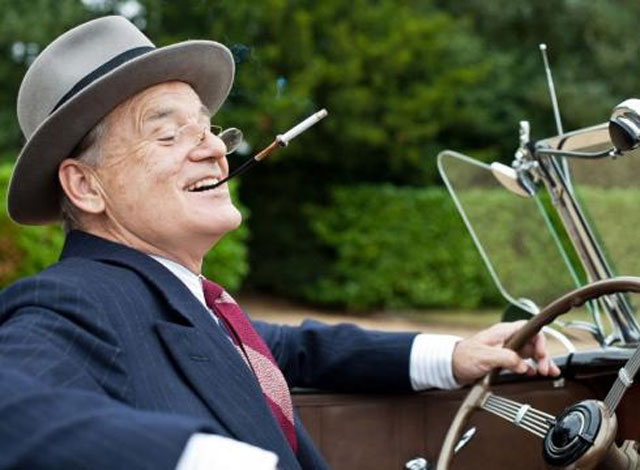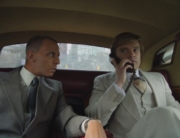
Bill Murray as Franklin D. Roosevelt (Nicola Dove/Focus Features)
Hyde Park on Hudson is a modern day follow-up to Sunrise At Campobello (1960), updated to include evidence that has since come out about the very complicated Roosevelt household, where several doting female intimates orbited around Franklin Delano Roosevelt’s sun separate from the circle of wife Eleanor and her activist friends. This revealing behind-the-scenes point of view is mostly from Franklin’s younger fifth cousin, Margaret “Daisy” Suckley, played by Laura Linney. (Eleanor’s father was also a fifth cousin). Her letters and diaries were discovered under her bed in her family’s faded Hudson River mansion when she died in 1991 at almost 100 years old, and they serve as the basis for the ongoing narration.
Set back in 1938, Daisy lives in reduced circumstances as an elderly aunt’s mousy paid companion when she gets a call from FDR’s domineering mother, Sara (Elizabeth Wilson), asking Daisy to keep FDR company: “I wasn’t the first relative his Mother called that day. Maybe not even the tenth.” (His birthplace and a home away from Washington, Hyde Park was Sara’s house. No wonder Eleanor had her own place built down the road.)
Daisy is first ushered into the president’s study as he putters over his stamp collection, which is of symbolic significance—after his death, his daughter found he had stashed Daisy’s letters among the collection. Played by Bill Murray, this FDR is a jaunty charmer, a calm center of a casually genteel but chaotic retreat, who can convince the press to not photograph him as he’s carried into a convertible by a strong bodyguard. (Daisy took one of the very few extant photographs of him in a wheelchair.)
The film’s first half covers their flirtation as he drives her through the Hudson River countryside of their extensive family (and where scripter Richard Nelson, too, lives). The spinster is flattered by his attention, and he enjoys her uncritical admiration, and takes her to a mountaintop where he woos her with plans to share a quiet cottage retreat. The film somewhat controversially goes a bit far in assuming just how much she relaxed him and how far physically they may have gone, and then assumes the naïve Daisy was jealous when she realized there were other women he was similarly seducing, particularly his very loyal secretary Margaret “Missy” LeHand (Elizabeth Marvel).
In fact, Daisy ended up in shared sympathy with another of his paramours, Lucy Mercer Rutherford, whose fond relationship with Franklin nearly destroyed his marriage early on and again embarrassed Eleanor when it became obvious at his death. More uncomfortably, this film reflects these adoring women’s self-serving view of Eleanor (Olivia Williams) as not catering enough to him and instead bothering him with public policy and her activism, though that was actually part of their private agreement that kept their public partnership going.
The first half shows well how FDR thrived by being surrounded by women, if nothing about his politics or his equal fondness for male poker pals, but the insular view of Eleanor echoes through the second half that awkwardly grafts on something of a follow-up to Tom Hooper’s The King’s Speech (2010). In the first-ever visit of a reigning British monarch to its former colony, the recently crowned stuttering King George VI comes to plead for America’s support in the coming war against Germany (despite the American public’s isolationism), and the young monarch is taken under the paternal wing of the disabled president, who puts his guests at ease with humor.
Shifting abruptly to the point of view of the king and queen (Samuel West and Olivia Colman), their unfamiliarity with an informal lifestyle seems exaggerated; they natter endlessly about the diplomatic significance of being served hot dogs at a barbecue even though Eleanor’s non-gourmet menus were as well-known as her cheerful tendency to sweep away protocol and formality as she made political points. Their shock at the nocturnal assignations of other house guests seems ridiculous given what they had just gone through over his brother’s affair with Wallis Simpson, or what they were probably exposed to in general around the aristocracy. The movie becomes too Roman Holiday-ish (among other royalty-on-the-lam movies) when the winking president takes the king on a playful afternoon to a swimming pool away from the press. The script loses the thread of Daisy’s story amidst the excitement of the royal visit, a shift to justify the king’s subsequent thank you note that first included a now familiar diplomatic phrase: “I feel we forged a special relationship.”
The film works too hard to explain the domestic goings-on for British director Roger Michell’s home audience (with a bit of upstairs/downstairs comparisons thrown in), and probably for younger ones, too. With all the Lincoln attention now on historian Doris Kearns Goodwin’s study of that president’s administration (Team of Rivals: The Political Genius of Abraham Lincoln), this film could draw people to her No Ordinary Time: Franklin and Eleanor Roosevelt—The Home Front in World War II (1994), which more fairly describes the behind-the-scenes of their very unusual, crowded household and spheres of friendship.






Leave A Comment